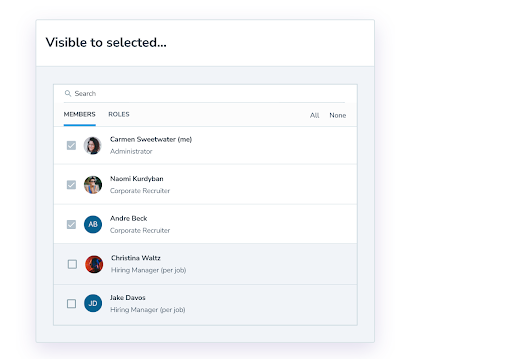TNS Experts
This post was submitted by a TNS experts. Check out our Contributor page for details about how you can share your ideas on digital marketing, SEO, social media, growth hacking and content marketing with our audience.
In this guide, you’ll learn more about the importance of quality hires and how data-driven recruitment can help your business in 2024.
For a long time, typical run-of-the-mill recruitment relied mainly on the luck of the draw and the hope that the organization's reputation was enough to appeal to the top talent looking for work. Nowadays, there’s a lot more to it, particularly when it comes to the scope of opportunity offered by the Internet.
While it has advantages, it can also make your recruitment drives a lot more challenging as you compete against other companies looking for similar roles. New start-ups and businesses are popping up every other day, meaning you have to be savvy with your recruitment strategy.
Thankfully, we all have access to data that can help drive recruitment in a positive direction.
In this guide, you’ll learn more about the importance of quality hires and how data-driven recruitment can help your business in 2024.
Hiring the right people for your teams or organization as a whole is pretty essential. The cost and time that a recruitment process can take is one that you want to avoid repeating where possible.
According to SHRM, filling a role can take an average of 27 days. That’s almost a month dedicated to finding a new employee who fits both the company dynamic and the role itself.
By finding quality hires, those responsible for recruitment can minimize the chances of having to repeat the process anytime soon. It can help improve retention rates of employees when you’ve hired the right people into the right roles.
A quality hire can perhaps lead to faster growth and success for the business as a result. They may need less training or onboarding in order to fulfill the duties of the role with ease.
Using data to aid your hiring process is one that can have a number of benefits. If those hiring know the current market, they can help plan to fill the positions required more effectively. They can spot gaps in the operation of the business, which
Data can be great for helping discover the problems that may be pre-existing. For example, you may find that the job listings you’re creating aren’t getting enough traction when it comes to candidates applying for the role.

The data may show that plenty of people are viewing the listing but very few convert to applicants. This may mean you have to restructure your listing or retweak certain parts to make it more appealing.
Hiring is a costly practice and on average, it’ll cost $1,633 per hire in the US alone. With the right data to hand, you can spend your budget wisely. It also helps to understand what expenses are required and what might be a waste of your money and resources.
The data can help you identify the right channels to advertise your job listings on to attract the most qualified leads.
The hiring process can often be lengthy, which is why data can be an excellent resource for streamlining the time it takes to fill the position. Your recruitment team or those responsible can make better decisions as they’re well-informed with the data they hold on the candidates. They can use data on their performance throughout the process to pick the right individuals.
There can be a lot of historical and comparative data that you have available and that can be useful in preempting how many applicants you'll need to interview or what roles will need to be filled over the year.
With data readily available, it can help benchmark and forecast any future hires you need for the business.
How do you implement data into your hiring process? Where do you get the data from? It’s easier said than done when your business might not be familiar with working with data when hiring. Here are four ways to implement data in your hiring process for 2024.
It’s important to ask what it is you’re looking for when it comes to the data. What answers do you want this data to reveal for your hiring process? Once you know the answers to your questions, you can go about sourcing that data more efficiently.
Data can be challenging to find without the right tools and software, which is why using software is important. That’s why you don’t guess when hiring the best, use data in your recruiting with Recruitee instead. It’s helpful to use platforms that can provide a wealth of data at your fingertips.

Whether it’s speed-based recruitment metrics that show the length of time for each interview stage to quality-based recruitment metrics that show the source of hires or candidates per hire, they’re all relevant metrics to utilize.
There are a variety of ways in which you can collect data and chances are you’ve already got some data available that you could be using. Thankfully, many of the platforms you’ll use online will be able to provide ample data through their own analytical dashboards. However, there are a couple of ways to source data in general.
It’s worthwhile, though, especially since survey generators are so easily accessible and can be created and distributed to rejected candidates.
A great way to help with decision-making for recruitment is by conducting pre-employment skills testing. For example, if you’re hiring a developer for the business, then using a vue.js developer skills test might be just what you need to get authentic performance results on the candidates you’re interviewing.
You may get plenty of candidates applying for the job in question but how many of them are actually capable of doing it successfully? There are those that expand on the truth a little too much that without the evidence of data, you could end up hiring someone whose not qualified enough.
There are likely to be many other recruitment processes in the future for your business and so it’s good to be prepared. With the right data, you can help plan for the future so that you’re not rushing hires for your business and making mistakes.
Planning ahead can save you money and ensure that the best candidates are always picked for the business. Data helps provide you with the knowledge that can aid the process, regardless of what role you’re trying to fill.
Improving the way you hire in 2024 can result in great things for your business. Here are a few extra tidbits that are worth knowing when it comes to improving the way you hire in 2024.
When you’re conducting a recruitment drive, whether it’s responding to candidate applications or conducting interviews, consider the candidate. Their experience matters for your future recruitment opportunities, and if you want the best talent to come knocking at your door, then it’s a good idea to build up a solid and positive reputation.
When it comes to hiring, knowing what you want is vital because it avoids delaying the process at any point or wasting a candidate’s time. Be detailed in what you require so that everyone is on the same page from start to finish.
With the correct data, recruitment can be made much easier and prove to be a lot more effective in the hires you make for any upcoming roles in 2024.
You’ll also receive some of our best posts today

This post was submitted by a TNS experts. Check out our Contributor page for details about how you can share your ideas on digital marketing, SEO, social media, growth hacking and content marketing with our audience.

Mobile devices have become an integral part of our lives in this digital...
Don’t miss the new articles!